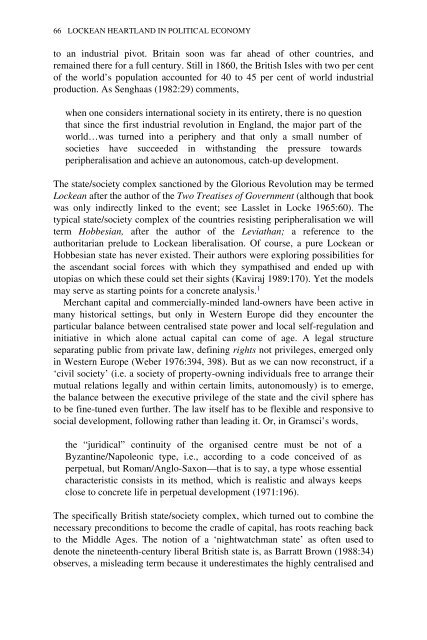van der pijl-transnational classes and IR
van der pijl-transnational classes and IR
van der pijl-transnational classes and IR
- No tags were found...
You also want an ePaper? Increase the reach of your titles
YUMPU automatically turns print PDFs into web optimized ePapers that Google loves.
66 LOCKEAN HEARTLAND IN POLITICAL ECONOMYto an industrial pivot. Britain soon was far ahead of other countries, <strong>and</strong>remained there for a full century. Still in 1860, the British Isles with two per centof the world’s population accounted for 40 to 45 per cent of world industrialproduction. As Senghaas (1982:29) comments,when one consi<strong>der</strong>s international society in its entirety, there is no questionthat since the first industrial revolution in Engl<strong>and</strong>, the major part of theworld…was turned into a periphery <strong>and</strong> that only a small number ofsocieties have succeeded in withst<strong>and</strong>ing the pressure towardsperipheralisation <strong>and</strong> achieve an autonomous, catch-up development.The state/society complex sanctioned by the Glorious Revolution may be termedLockean after the author of the Two Treatises of Government (although that bookwas only indirectly linked to the event; see Lasslet in Locke 1965:60). Thetypical state/society complex of the countries resisting peripheralisation we willterm Hobbesian, after the author of the Leviathan; a reference to theauthoritarian prelude to Lockean liberalisation. Of course, a pure Lockean orHobbesian state has never existed. Their authors were exploring possibilities forthe ascendant social forces with which they sympathised <strong>and</strong> ended up withutopias on which these could set their sights (Kaviraj 1989:170). Yet the modelsmay serve as starting points for a concrete analysis. 1Merchant capital <strong>and</strong> commercially-minded l<strong>and</strong>-owners have been active inmany historical settings, but only in Western Europe did they encounter theparticular balance between centralised state power <strong>and</strong> local self-regulation <strong>and</strong>initiative in which alone actual capital can come of age. A legal structureseparating public from private law, defining rights not privileges, emerged onlyin Western Europe (Weber 1976:394, 398). But as we can now reconstruct, if a‘civil society’ (i.e. a society of property-owning individuals free to arrange theirmutual relations legally <strong>and</strong> within certain limits, autonomously) is to emerge,the balance between the executive privilege of the state <strong>and</strong> the civil sphere hasto be fine-tuned even further. The law itself has to be flexible <strong>and</strong> responsive tosocial development, following rather than leading it. Or, in Gramsci’s words,the “juridical” continuity of the organised centre must be not of aByzantine/Napoleonic type, i.e., according to a code conceived of asperpetual, but Roman/Anglo-Saxon—that is to say, a type whose essentialcharacteristic consists in its method, which is realistic <strong>and</strong> always keepsclose to concrete life in perpetual development (1971:196).The specifically British state/society complex, which turned out to combine thenecessary preconditions to become the cradle of capital, has roots reaching backto the Middle Ages. The notion of a ‘nightwatchman state’ as often used todenote the nineteenth-century liberal British state is, as Barratt Brown (1988:34)observes, a misleading term because it un<strong>der</strong>estimates the highly centralised <strong>and</strong>


